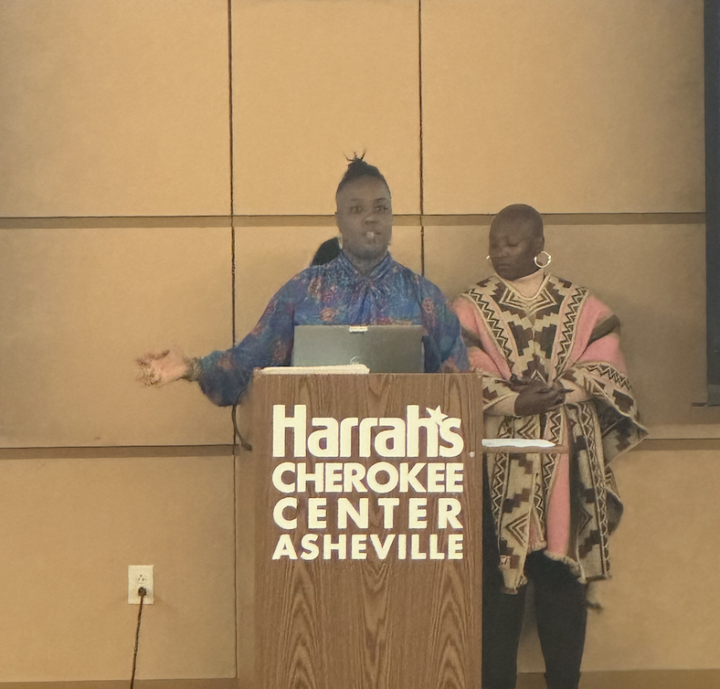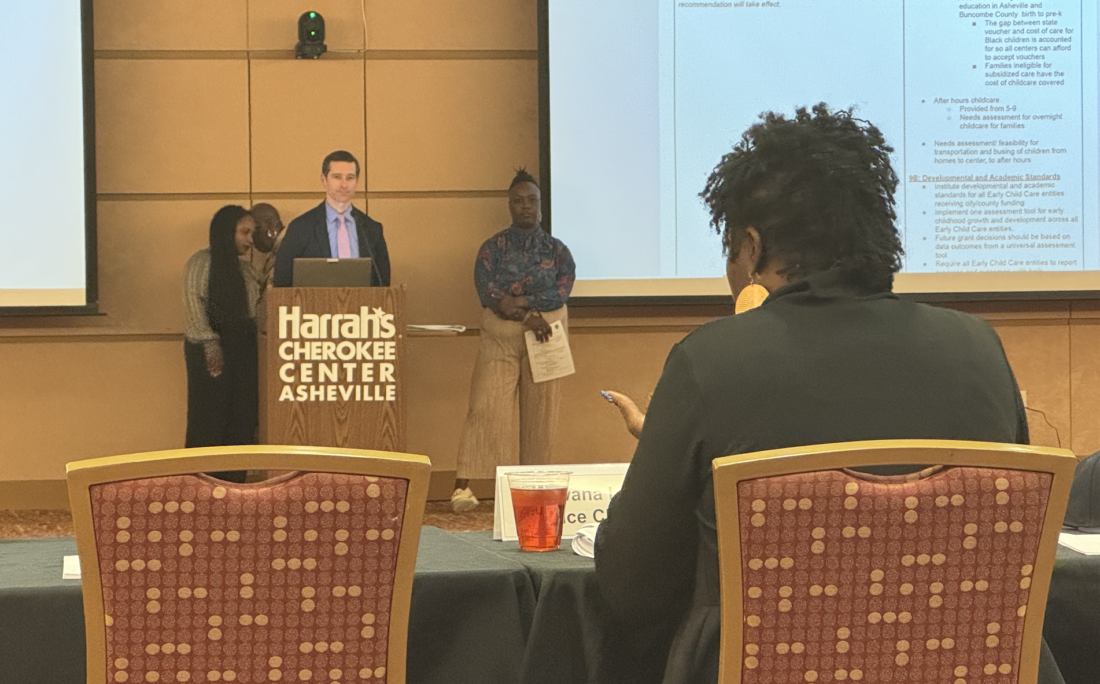As a June deadline looms, recommendations from Asheville’s reparations commission are coming fast and furious, though support is not unanimous among its members.
The Community Reparations Commission of Asheville and Buncombe County passed three education-centric recommendations May 13, adding to the four endorsed earlier this month, informing how the city and county can make amends for generations of discrimination toward Black residents.
At the meeting, Dwight Mullen also announced he was stepping down as chair. He said that as the spokesperson for the group, the national attention has taken a toll on his health.
The latest slate of recommendations would establish an education-focused community resource center on land taken by the city during urban renewal, provide universal early childhood education for Black students and create more resources for Black students in post-secondary institutions.
The four passed May 6 include a guaranteed income pilot program to provide unconditional, direct, monthly cash payments to low-income individuals.
Specific parameters of the guaranteed income program, which commission members say exists in 100 other cities, will be refined by a reparations accountability advisory council — another recommendation that passed May 6 — along with city and county governments.
Legal debate
However, the legality of targeting Black residents specifically for various services remains unclear, sparking debate among commission members.
In an apparent reference to critics of the guaranteed income program, Mullen started the meeting defending the group’s work.
“I know it’s controversial, but I refuse to agree with the claim that what we are doing is unconstitutional. What we’re doing is for Black people,” he said. “We’re doing it for our youth. We’re doing it for folks who have passed on.”
One element of the post-secondary education recommendation is to provide any Black resident with a high school diploma or its equivalent with tuition, books and room and board at any public institution in the state university system. Community college students would get guaranteed income in lieu of room and board under the proposal.

Commission member Dee Williams asked Brad Branham, the City of Asheville’s legal counsel who attends every meeting, if targeting only Black residents was legal.
Branham said he would have to do more research to see if there is any precedent specifically around the post-secondary recommendation, but that generally there are “tremendously fewer restrictions” placed on scholarships or services that are paid for with private, rather than public, funds.
Branham had more concrete advice during discussion of the commission’s recommendation for universal early childhood education for Black students regardless of income.
“I think that the specificity of race creates legal challenges. It is difficult for us, based upon current constitutional laws, to have that kind of criteria. Oftentimes, the utilization of income is an alternative, which we do have much more authority in. So taking [the income criteria] out creates additional questions that would have to be navigated,” Branham told the full commission.
Branham clarified that it is not illegal to use race as a defining characteristic across the board, citing the city’s existing program where race is considered when hiring contractors for certain functions. But he said in some areas, it is more difficult to target residents along racial lines, suggesting universal early childhood education could be challenged if funded with public dollars.
“City and county statutes provide us a tremendous amount of authority to provide subsidies and funding and programs where income is the classification. Now, admittedly, I will say that by using something like income as the determining factor, you are giving up a certain amount of specificity while you’re gaining a great deal of legal defensibility. It’s a question that I think this particular body should and has considered,” he said.
Commission Vice Chair Dewana Little pushed back on the suggestion that the commission should avoid specifying its recommendations are specifically for Black residents, since that’s why the group was formed to begin with.
“What I don’t want to happen is for us to make these recommendations and then feel like we need to exclude Black people. That’s the whole point of me even sitting at this table,” she said.
Little said she doesn’t want the final recommendations to be so broad that afterward anyone can benefit from the work that the commission has done to repair generations of injustice to Black people. Even if it causes challenges for the city and county legal teams, she said it shouldn’t be something the commission should deal with at this stage.
“All lower-income people have not dealt with the oppression and the exclusion and the racist systems that we have had to navigate as Black people in America. And we need to be intentional to that in this process,” she added.
How much will it cost?
The lack of specifics around how much the recommendations would cost was another sticking point for Williams, who voted against all three of the May 13 recommendations because she said they were not legally and financially feasible.
Little also expressed concern that the recommendations did not have price tags attached, suggesting they might get more serious consideration from elected officials if the commission put at least approximate figures on each proposal.
Commission members MZ Yehudah and Keith Young said it wasn’t the commission’s job to determine how its recommendations would be funded but to simply identify the harms and suggest ways they could be remedied.
“They have promised that if they do not have the money in the budget that they will go elsewhere to find the money because the goal is to repair the harms. It is not our job as a commission to stop the city and the county from going to get the funds that they need to fulfill their promise to the Black community,” Yehudah said.
Young added that as laypeople, the commission shouldn’t be expected to come up with specific costs for each of its wide range of recommendations.
Commission to request extension
As has become commonplace at the monthly commission meetings, several members brought up the need for more time to finalize recommendations. The May 13 meeting was no exception.
Sala Menaya-Merritt, equity and inclusion director for the City of Asheville, said that the commission needed to specifically ask for more time from Asheville City Council and justify the request. Mullen and Little went before City Council in December to express commission members’ desire for more time but were told they needed to provide an explanation for why it was needed.
“They were asked to come back to show what they had done and to explain why they would need an extension beyond June. That request has not been made as of yet,” Menaya-Merritt said.
“It’s definitely necessary. We’ve been talking about it, and I assumed it was known. We as a commission do want to look at what an extension would look like,” Little said in response.
A vote for an extension will be placed on the agenda of the June 10 meeting, Little said.
Leadership change
Another upcoming agenda item will be choosing a new chair.
“The time and stress is taking its toll, you can hear it in my voice. That’s not emotion, it’s fatigue,” Mullen said.
He said he plans to stay on the commission as a member and offered to do “anything you ask of me other than chair.” He said it’s not the fight he’s stepping away from but the national attention. People have called to ask him to speak at conferences or for ideas for reparations movements in California.
“What you’re doing is causing attention from across the nation. And those people are calling me,” he noted.
“These things are going to multiply as your recommendations go out. I encourage you to look at what you’re doing is setting the precedent for the nation. So this conversation about race and color, whether or not reparations are constitutional, those things are going to come. Don’t be afraid to step up. I just can’t do it, but I am there supporting you.”
The commission will discuss the leadership transition at one of its June meetings. There is a virtual meeting scheduled for Monday, June 10, and its last scheduled meeting is Monday, June 17, in the banquet room at Harrah’s Cherokee Center – Asheville.
Learn more about the Community Reparations Commission at avl.mx/dq6.





Never will happen.
US economy is hanging by a thread…but billions to be laundered through Ukraine is a national security priority, ha!
Oh, and despite being terrible case law and enacted unconstitutionally, be that as it may, the 14th amendment will not allow for targeting of “Blacks” for reparations.
Stay focused people, Oceania has always been at war with Eurasia.
That is all.
Shalom
Why are all the demented MAGA wingnuts so enamored with Putin? And so very interested/ enamored in/with chaos between the races? hummm….
I weep for them that open racism is so hard to get done.